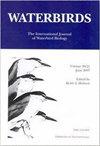种群干扰对加勒比玫瑰燕鸥繁殖成功及巢护行为的影响
IF 0.6
4区 生物学
Q3 ORNITHOLOGY
引用次数: 2
摘要
摘要海鸟群体中的异种干扰会通过直接影响(如捕食)和间接影响(如通过防御行为增加亲本能量消耗)对繁殖成功产生负面影响。本文利用远程鸟巢摄像机,评估了入侵对美国和英属维尔京群岛红燕鸥(Sterna dougallii)早期鸟巢生存和捕食风险的影响。此外,还研究了群体大小等群体特征对亲代巢防御的影响,以评估个体对群体中捕食者的反应。我们统计了118个巢的141次入侵事件,发现异种干扰的频率不影响巢的存活,但与捕食率呈正相关。干扰随蜂群大小和覆盖率的增加而减少,随巢密度的增加而增加,表明大蜂群中隐蔽的、孤立的巢受到干扰的可能性较小。随着蜂群大小和巢密度的增加,亲本巢防御能力显著降低。结果可能是由我们系统中的主要捕食者类型驱动的——大型掠食性鸟类和入侵性老鼠——因为父母更有可能在这些捕食者类型入侵时离开巢穴。本文章由计算机程序翻译,如有差异,请以英文原文为准。
Effects of Colony Disturbance on Reproductive Success and Nest Defense Behaviors in Caribbean Roseate Terns
Abstract. Heterospecific disturbance in seabird colonies can negatively influence reproductive success both through direct effects, such as predation, and through indirect effects, such as increasing parental energy expenditure via defense behaviors. Here, remote nest cameras were used to evaluate the effects of intrusion on early nest survival and predation risk in Roseate Tern (Sterna dougallii) colonies in the U.S. and British Virgin Islands. Effects of colony traits such as colony size on parental nest defense were also investigated to assess individual response to predator presence in colonies. We counted 141 intrusion events at 118 nests and found that frequency of heterospecific disturbance did not influence nest survival, but did have a positive association with predation rate. Disturbance decreased significantly with colony size and % cover, and disturbance increased with nest density, indicating that concealed, isolated nests within large colonies were less likely to be disturbed. Parental nest defense decreased significantly with colony size and nest density. Results were likely driven by the dominant predator types in our system—large predatory birds and invasive rats—as parents were more likely to leave nests with intrusion from these predator types.
求助全文
通过发布文献求助,成功后即可免费获取论文全文。
去求助
来源期刊

Waterbirds
生物-鸟类学
CiteScore
1.30
自引率
0.00%
发文量
0
审稿时长
6-12 weeks
期刊介绍:
Waterbirds is an international scientific journal of the Waterbird Society. The journal is published four times a year (March, June, September and December) and specializes in the biology, abundance, ecology, management and conservation of all waterbird species living in marine, estuarine and freshwater habitats. Waterbirds welcomes submission of scientific articles and notes containing the results of original studies worldwide, unsolicited critical commentary and reviews of appropriate topics.
 求助内容:
求助内容: 应助结果提醒方式:
应助结果提醒方式:


